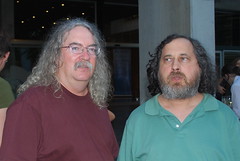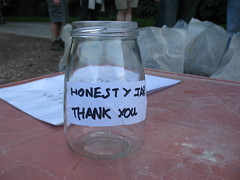Some time ago I wrote about how I met Siemens for the first time in Berlin 2006. Today I will turn to Stephen Downes, more specifically his engagement for free learning. First, something totally irrelevant, though. Being a young man in the late sixties and during the seventies, a time in history when all people looked "normal" as I teased my daughter taking the people in the Woodstock movie as an example, I intuitively felt that a man with the appearance of Stephen Downes must have something important to tell me. I haven't been disappointed to use an understatement. At the moment I am working my way through his book "Free Learning" which can be freely downloaded from his website. In this post I am going to reflect on the chapter "Will Richardson's Business Model" (p.27 ff).
The story begins with Richardson complaining about someone using his website to attract potential customers. He is advised by someone not to use the Creative Commons and particularly not NC because it is to vague. It could simply be abondoned, says the adviser. Eventually the antagonists come to the question: What about Stephen Downes? Is he untainted? Downes declares that he is employed by the National Research Council of Canada and that he never charges any fees for presentations, consulting, articles etc. However, his work is often "used" and not merely cited.
Some of his work is reused on a commercial basis, his site is syndicated by others and his work is aggregated by commercial web sites. There seems to remain two options, either to take legal actions against the violators or simply abondon the idea of giving things away for free i.e. non-commercial (NC). Downes will not choose either of these alternatives.
He simply says that life is too short to be bothered by such things. Anyone out there can se the flagrant violations and accordingly, the violators through their own actions, reveal that they are not to be trusted.
What I have done, Downes explains, with my license is to express what I want and how I want my content to be treated. It is possible to take legal action but in reality it is not reasonable option. Downes also calls attention to that he has expressed a desire to be treated nicely, a desire that people tell the truth and be courteous to him.
Precision is for lawyers, he writes. It is for people who are trying to obtain maximum benefit without real regard to other's interests. If someone finds a loophole and exploits that they actually demonstrate that they do not care about what the other person wants. When there is vagueness in the rules it allows a person's character to emerge. If I were not sure if it is ok to use something I should ask if good relations are more important than the money possible to earn by taking advantage of the vagueness. I don't sue people, says Downes, but I don't embrace their behaviour either. When people disrespect my wishes, I will have nothing to do with them. I will not trust them.
Sometimes it may appear that dishonesty prosper in an anonymous society. The person who cuts the line may appear to have gained something at our expense. Downes's belief is that such a life is not one that profits. It is a life led solitary and alone. Acually, the essence of living in a community is to respect the interests, rights and desires of other members. Those who disregard all this will find themselves excluded from the community and the benefits of belonging. These benefits go well beyond merely financial gain.
The more you give away, the more your reputation is assured. And with that comes friendship, sharing, mutual support and loyalty. On the other hand, if you copy someone's work and and thereby happen to earn some money, what is your standing in an educational community? What will your relation to the rest of us be like? Is it still possible to participate in the dialogue, joy and what we achieve together? Downes summarizes: Whatever it is that prompts a person to behave dishonestly, it isn't worth it. Never.
I think what Downes has expressed in his chapter (somewhat simplied by me) is well worth considering and I wish we all had could have such a constructive attitude.









Inga kommentarer:
Skicka en kommentar